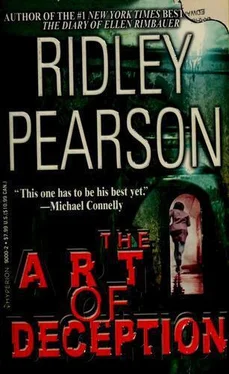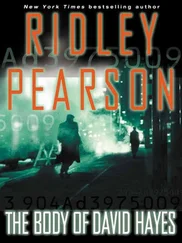Ridley Pearson - The Art of Deception
Здесь есть возможность читать онлайн «Ridley Pearson - The Art of Deception» весь текст электронной книги совершенно бесплатно (целиком полную версию без сокращений). В некоторых случаях можно слушать аудио, скачать через торрент в формате fb2 и присутствует краткое содержание. Жанр: Триллер, на английском языке. Описание произведения, (предисловие) а так же отзывы посетителей доступны на портале библиотеки ЛибКат.
- Название:The Art of Deception
- Автор:
- Жанр:
- Год:неизвестен
- ISBN:нет данных
- Рейтинг книги:3 / 5. Голосов: 1
-
Избранное:Добавить в избранное
- Отзывы:
-
Ваша оценка:
- 60
- 1
- 2
- 3
- 4
- 5
The Art of Deception: краткое содержание, описание и аннотация
Предлагаем к чтению аннотацию, описание, краткое содержание или предисловие (зависит от того, что написал сам автор книги «The Art of Deception»). Если вы не нашли необходимую информацию о книге — напишите в комментариях, мы постараемся отыскать её.
The Art of Deception — читать онлайн бесплатно полную книгу (весь текст) целиком
Ниже представлен текст книги, разбитый по страницам. Система сохранения места последней прочитанной страницы, позволяет с удобством читать онлайн бесплатно книгу «The Art of Deception», без необходимости каждый раз заново искать на чём Вы остановились. Поставьте закладку, и сможете в любой момент перейти на страницу, на которой закончили чтение.
Интервал:
Закладка:
Never taking his eyes off the approaching suspect, Boldt said, “We now know that neither Hebringer nor Randolf received any cash from those machines. What we’re trying to determine is whether or not either of their cards ever logged on for the two days in question.”
“They can do that?” she asked.
“Supposedly any attempt, even a canceled session, registers with the system.”
“He nabbed them before they ever got their money,” she suggested.
“Who’s going to think anything of some guy in blue coveralls wearing a security tag on his chest pocket? He’s sweeping up the room. So what? They use their card to enter, turn toward one of the machines, and take his broomstick to the back of the head. He’s got them through that emergency exit door before they’re even half conscious.”
“But it’s a glass room, Lieu. It’s a well-lit glass room.”
“Guys like Vanderhorst, they thrive on that moment. Just ask Matthews. For those few seconds he’s dragging the body toward the door, he’s as high as he’s ever been.”
“You creep me out sometimes, Lieu.”
“No, not me, Bobbie. It’s them.” Boldt motioned her down, and slouched himself.
She scootched down and reached for her door handle. “We grab him on the way out, or back up Big Mac, or what?”
Vanderhorst paused ever so briefly in front of the bank and gave the block a once-over. He failed to make anything of the steam cleaning panel van across the street, the homeless guy with his guitar case open playing a horrible rendition of “This Land Is Your Land,” or the tall black woman walking the German shepherd, who was himself a member of the K-9 unit.
“What the hell?” Gaynes asked, eyeing the mirror.
“He just convinced himself it’s safe.”
“That motherfucker’s got some loose screws, Lieutenant.”
Boldt hoisted the radio’s handset. “All units: We play this exactly as I laid it out in Situation.”
“Affirm,” came the voice of Dennis Schaefer from the steam cleaning van. Schaefer, a Special Ops dispatcher on the force, had the combined role of play-by-play sports broadcaster and team captain. It still left Boldt the coach.
He plugged an earpiece jack into the radio and filled his right ear with its ear bud.
The moment Vanderhorst entered the bank, Boldt and Gaynes headed directly to the ATM room, where Boldt swiped a borrowed card admitting them. He felt unusually warm as they passed through what was typically the alarmed exit door without a sound.
He’d been advised that it would take Vanderhorst between three and ten minutes to both retrieve and cash his paycheck at the teller window. Boldt was told he could count on the maintenance man standing at the counter for that length of time.
Mackenzie, at a stand-up check writing desk, would alert dispatch if actual events inside the bank varied from this.
Boldt had assigned one uniformed officer to stand guard on the other side of the loose panel discovered in the bus tunnel’s emergency exit. He had another four uniforms at possible street-level exits suggested by Professor Babcock. He had radio cars forming a perimeter. The safe money said to pick up Vanderhorst the moment they had him confined. It was not like Boldt to play chances, but that’s what he had in mind, and Gaynes had clearly sensed this. If it went south on him, the review board would rule that he’d allowed personal pressures to influence his decision making, to dictate actions taken, to cloud his judgment.
They would be right, of course, though he’d vehemently deny it. Susan Hebringer ran this operation by proxy. Once Vanderhorst was officially under arrest, statistics said that their chances of ever finding his victims were greatly reduced. Sometimes perps rolled over in interrogation. But with nothing but circumstantial evidence-an ATM receipt and some compromised blood evidence, with no clear way yet to connect the ATM room to the Underground, and, more important, to show Vanderhorst’s knowledge of that connection, Boldt could foresee Vanderhorst walking out of Public Safety a free man.
He and Gaynes reached the bank’s second-floor offices winded. He knocked on a door marked PRIVATE and was welcomed a moment later by an attractive young woman in a smart gray suit and, beyond her, two men in private security garb manning a bank of five black-and-white television monitors, all of which were hardwired to hidden cameras.
Each screen offered a variety of looks at various parts of the bank, including the main lobby, the ATM anteroom, and the downstairs hallway through which they had just passed.
Gaynes asked Boldt, “Are you telling me we already have him on camera abducting these women?”
“Twenty-four-hour loops are reused after seventy-two hours,”
Boldt explained in whispered disappointment. “Long since erased.”
“Yeah?” she said, gesturing toward the bank of monitors, “Well, we’ve got him now.”
Vanderhorst stood at a teller window to the right of the large room, his back to the camera. Detective Frank Mackenzie maintained his position at the check writing counter, close to the main doors and the only exit to the streets.
Boldt’s plan revolved around Mackenzie’s ability to deliberately slip up while attempting to act the part of undercover cop. Mackenzie, a big tree trunk of a man with seventeen years on the force, had been selected for this role in part because of his legendary reputation as a thespian. In the summers, he took time off to join the Ashland, Oregon, theater troupe responsible for that city’s Shakespeare festival. As a lieutenant and team leader, Boldt’s responsibility was to make the most of his assets.
The screens lacked any sound, and so the commotion that followed on the bank’s main floor played out on the one television screen silently, making the action all the more eerie and disconnected. Boldt listened to SPD dispatch in his right ear, mentally dialing it into the background.
“Can we hold on number four, please?” Boldt asked as he and Gaynes stepped closer.
She whispered, “I’d rather be in the movie, than watching it.”
“Stay tuned, we may be yet,” Boldt informed her. “First, we see how smart Vanderhorst is.” He lifted the handheld, tripped the TALK button, and issued the order he knew he’d be held responsible for: “Okay, let’s do it.”
“Affirm.” Dispatcher Dennis Schaefer’s reply passed thinly through Boldt’s earpiece. Mackenzie was ordered to “lay the bait.” The rest of the team was put on high alert. Like most operations, after several hours of waiting, the real-time event was likely to play out in a matter of seconds or, at the most, a few minutes. For those few precious moments, disparate players, several city blocks away from each other, had to move, think, coordinate, and act in harmony. Anything less, and Vanderhorst was likely to escape. Denny Schaefer was the stage manager, but Lou Boldt was the playwright, and as such, he listened and watched carefully.
On the small screen Frank Mackenzie unplugged his earpiece from his radio and then fiddled with a knob, turning up the volume.
The message from dispatch: “Suspect is in the building,”
played over Boldt’s radio at the same time it did Big Mac’s-as planned. The message spilled into the bank lobby, turning heads.
This was it. Boldt leaned in and watched. Vanderhorst, along with everyone else in the lobby, overheard Mackenzie’s radio.
The suspect cocked his head slightly in that direction, but he did not overreact. His left hand pocketed the cash from his paycheck. Mackenzie did a convincing job of playing the buffoon.
He dropped the radio, turned the volume back down, and tried to look like nothing had happened. He then took a couple obvious steps toward the entrance, clearly planting himself to block the main doors. A colorful sign there advertised the benefits of home equity loans.
Читать дальшеИнтервал:
Закладка:
Похожие книги на «The Art of Deception»
Представляем Вашему вниманию похожие книги на «The Art of Deception» списком для выбора. Мы отобрали схожую по названию и смыслу литературу в надежде предоставить читателям больше вариантов отыскать новые, интересные, ещё непрочитанные произведения.
Обсуждение, отзывы о книге «The Art of Deception» и просто собственные мнения читателей. Оставьте ваши комментарии, напишите, что Вы думаете о произведении, его смысле или главных героях. Укажите что конкретно понравилось, а что нет, и почему Вы так считаете.












